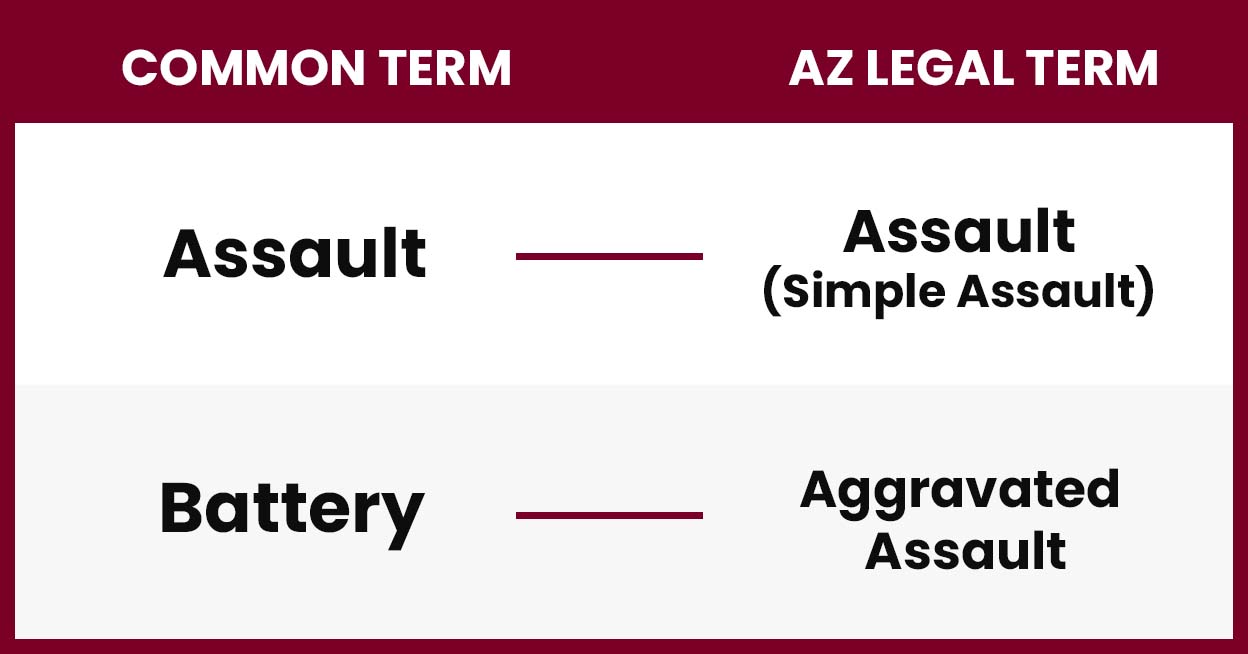What is the difference between Assault and Battery Charges in Arizona?
If you’ve ever watched a crime show, you’ve likely come across the terms “assault and battery.” Pop culture has certainly popularized these two crimes, but what exactly do they entail? It’s easy to get confused because the common understanding of these crimes can be quite different from their legal definitions. Many people associate assault with physical violence, while battery might seem less severe, often perceived as intimidation or the threat of violence. However, in reality, their meanings are the opposite.
Assault: In simple terms, assault involves causing fear of physical force or violence combined with the present ability to carry it out. On the other hand, battery refers to the actual act of causing physical injury to someone.
What is an example of Assault and Battery?
To illustrate this, consider a scenario where two individuals are involved in a minor car accident. Both drivers exit their vehicles and engage in a heated argument. One of them retrieves a baseball bat from the trunk of his car and makes threatening gestures, indicating that he intends to harm the other driver. This situation could be considered assault. Now, suppose he goes beyond threats and actually strikes the other driver with the baseball bat, causing physical injury. In this case, the physical injury would be classified as battery.
Think of it like this: when you make batter for baking, you combine ingredients by striking or mixing them together. Similarly, the crime of battery involved physical force just as you must apply physical force to turn dough into batter. Returning to the driver scenario, the first driver could be charged with both assault (for the threat of violence) and battery (for the actual act of violence). This distinction helps clarify the legal definitions of these terms.
Now that we’ve clarified the definitions of assault and battery, here’s an interesting twist: Arizona Law doesn’t use the term ‘battery!
How Arizona Law Defines Assault & Battery
Assault, as we’ve been discussing its meaning, is also defined as assault under Arizona Law. Generally, we refer to it as simple assault for greater clarity. The legal definition of assault in Arizona can be found in Arizona Statute A.R.S. §13-1203. You can see the legal definition on FindLaw.com by clicking the following link: A.R.S. §13-1203
Battery, as we’ve been discussing it, is defined as aggravated assault under Arizona Law and can be found in Arizona Statute A.R.S. § 13-1204. You can read the legal definition by clicking the following link: A.R.S. § 13-1204

Are assault and battery serious crimes?
Assault and battery charges are serious legal matters that can have life-altering consequences for those accused. In Arizona, these charges are taken seriously, and the legal system is designed to protect the rights of both victims and the accused. Understanding the nuances of assault and battery charges, as well as potential defenses and legal strategies, is crucial for anyone facing these allegations in the Grand Canyon State.
What is assault under Arizona Law?
In Arizona, assault is a legal term that is often used interchangeably with the colloquial understanding of the word, but its legal definition is more specific. Assault, as defined under Arizona Statute A.R.S. §13-1203, encompasses various scenarios in which an individual intentionally or recklessly causes apprehension of physical injury to another person. This means that the key elements of assault involve intent, recklessness, and the creation of a reasonable fear of physical harm in the victim.
To further break it down, assault in Arizona can occur in two primary ways:
Intentional Act: The most straightforward form of assault involves the deliberate intent to cause fear or apprehension of physical injury in another person. For example, if someone raises their fist in a threatening manner, intending to strike another person, that action could be considered an assault because it creates a reasonable fear of physical harm.
Reckless Conduct: Assault can also occur through reckless behavior, where an individual consciously disregards a substantial and unjustifiable risk that their actions may cause physical injury to another person. In such cases, the reckless conduct must result in the victim’s apprehension of imminent physical harm. An example of this could be driving a car directly at a person with the intent to scare or intimidate them, causing the person to fear being hit.
It’s important to note that under Arizona law, assault is generally classified as “simple assault” to distinguish it from more severe forms of assault, such as aggravated assault, which involve additional elements and often result in more serious consequences. Simple assault, however, is still a criminal offense that can have legal ramifications for those charged with it.
What is Aggravated Assault under Arizona Law?
In Arizona, aggravated assault is a more serious offense than simple assault and is defined under Arizona Statute A.R.S. §13-1204. Aggravated assault occurs when an individual intentionally, knowingly, or recklessly causes serious physical injury to another person or uses a deadly weapon or dangerous instrument during the commission of the assault. Let’s break down the key elements that constitute aggravated assault:
Intent, Knowledge, or Recklessness: Similar to simple assault, aggravated assault can be committed with intent, knowledge, or recklessness. This means that the person charged with aggravated assault must have either intended to cause harm, known that their actions would likely result in harm, or acted recklessly by disregarding a substantial risk of harm.
Serious Physical Injury: One of the defining characteristics of aggravated assault is the infliction of serious physical injury upon the victim. Serious physical injury refers to injuries that are severe, life-threatening, or result in significant bodily harm. Examples of serious physical injuries can include gunshot wounds, broken bones, or injuries requiring surgery or hospitalization.
Use of Deadly Weapon or Dangerous Instrument: Another way aggravated assault can occur is when a deadly weapon or dangerous instrument is used during the commission of the assault. A deadly weapon can be any object or instrument that is designed for or capable of causing death or serious physical injury. This can range from firearms and knives to items used with the intent to cause harm, such as a baseball bat. A dangerous instrument is any object that is used in a manner likely to cause death or serious injury.
Aggravated assault is a felony offense in Arizona, and the severity of the charge can vary depending on factors such as the extent of the injuries, the use of weapons, and the intent of the accused. Convictions for aggravated assault can result in significant penalties, including imprisonment, fines, and a criminal record. Therefore, understanding the legal definition of aggravated assault and its consequences is crucial for individuals facing such charges in Arizona.
Deciphering Assault and Battery: Legal Definitions and Distinctions
In this article, we’ve unraveled the complexities surrounding assault and battery, shedding light on their distinct legal definitions and helping to dispel common misconceptions. While pop culture may have muddied the waters, it’s crucial to grasp the precise meanings of these terms in a legal context.
Assault, as we’ve clarified, involves the threat of physical force with the present ability to carry it out. On the other hand, battery pertains to the actual physical harm inflicted upon another individual. Drawing parallels to the act of making batter, where ingredients are mixed through striking, can serve as a mnemonic aid in distinguishing these two crimes.
If you find yourself facing allegations of assault or aggravated assault, please contact my office immediately. I am here to provide careful legal guidance and ensure your rights are protected throughout the legal process. Your future and peace of mind is my top priority.

